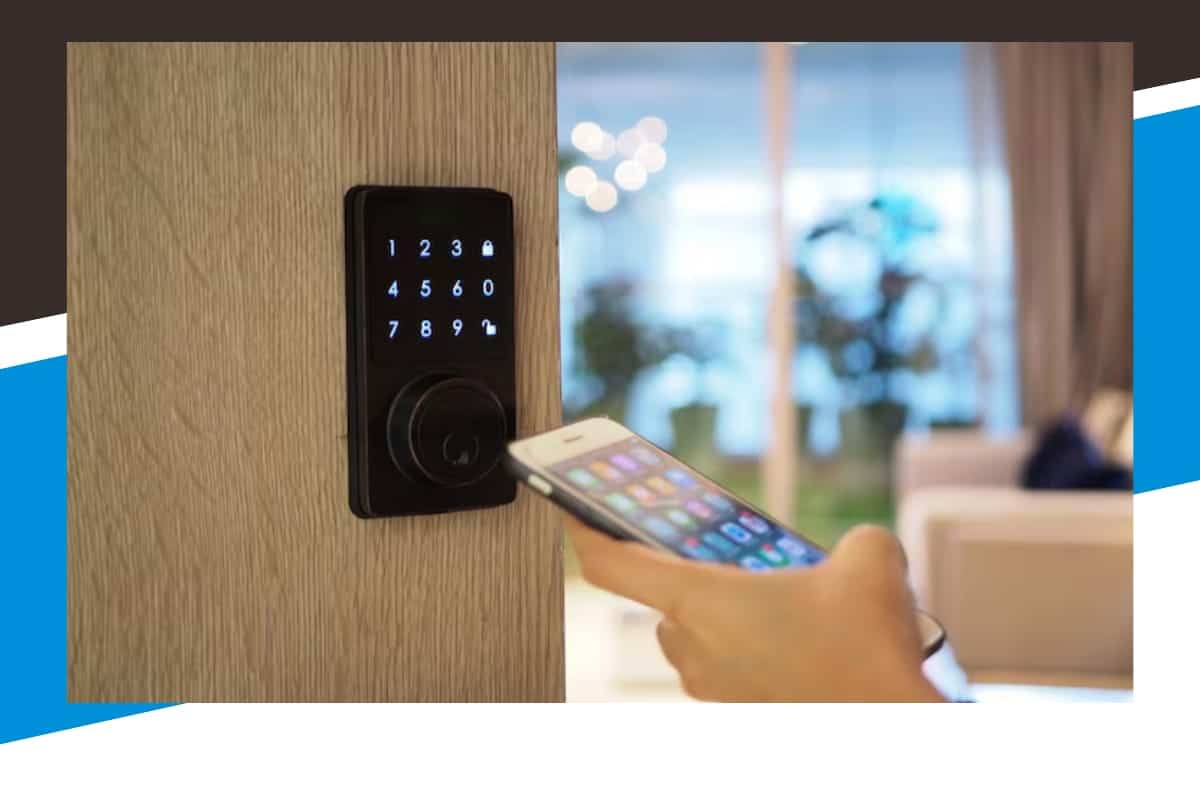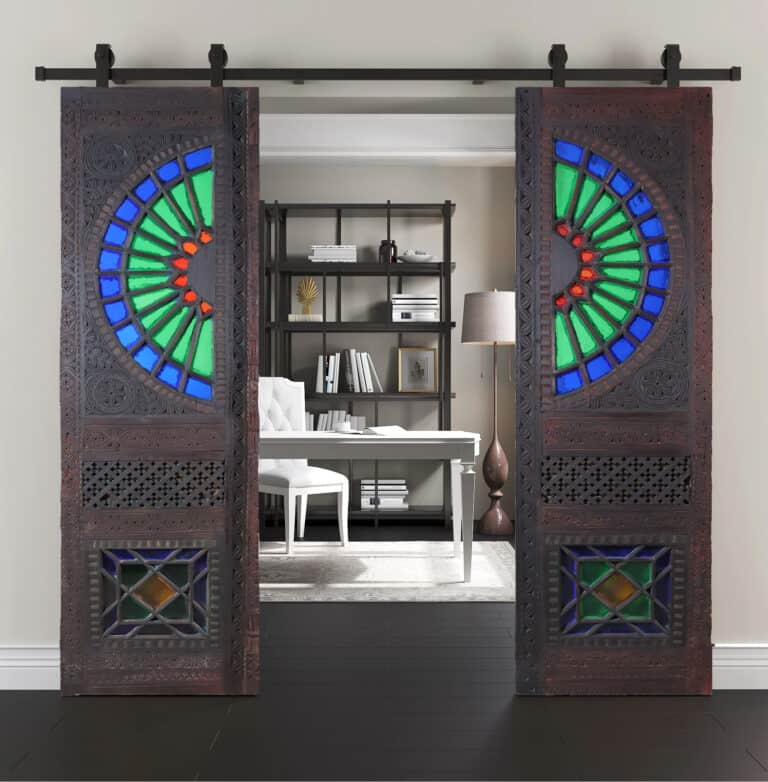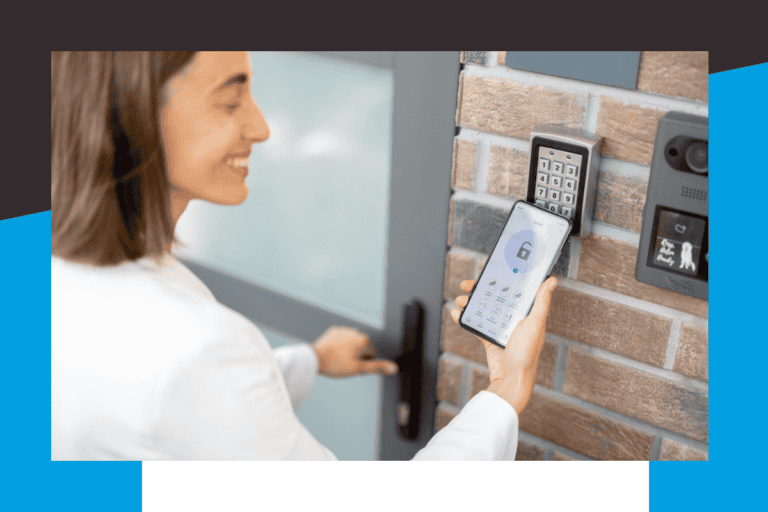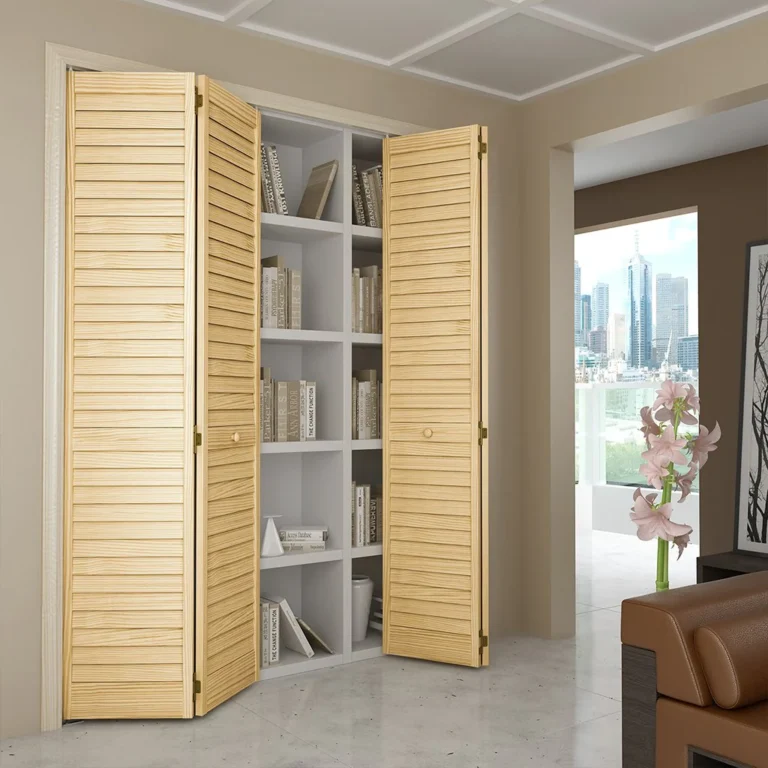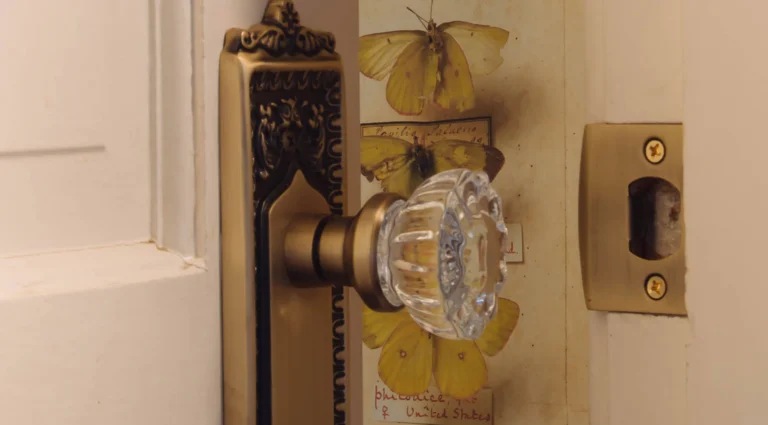Choosing the right lock for your front door isn’t just about looks; it’s about keeping your home safe. But with all the options out there, how do you decide between traditional locks and smart locks?
On one hand, you have traditional door locks—the classic choice, known for their simplicity and reliability. On the other, you’ve got smart door locks that offer advanced features like remote access and keyless entry, making them a tempting choice for modern homes.
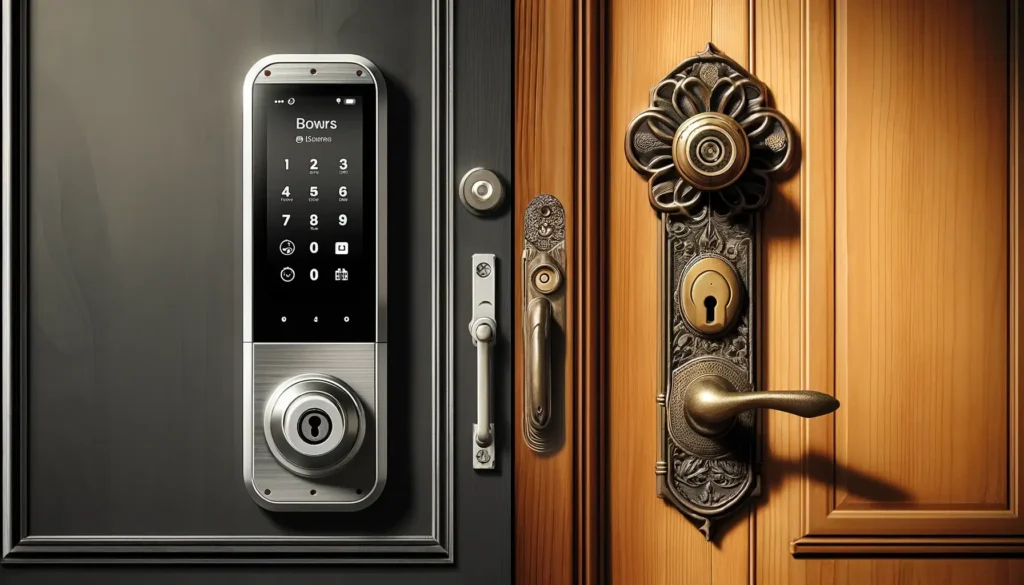
In this guide, we’ll dig into the key differences between smart locks vs traditional locks, looking at security, convenience, and cost to help you make the best choice for your home. Whether you’re all about the latest tech or just want a secure lock to keep things simple, we’ll break down everything you need to know.
What are Smart Locks and Traditional Locks?
Smart Locks
These locks are electronic systems designed to enhance home security and convenience. Unlike traditional locks, they don’t rely solely on a physical key. Instead, they often use biometric authentication like fingerprints or facial recognition, along with options like keyless entry via mobile apps or access codes. This allows you to control and monitor your door from anywhere using remote access features.
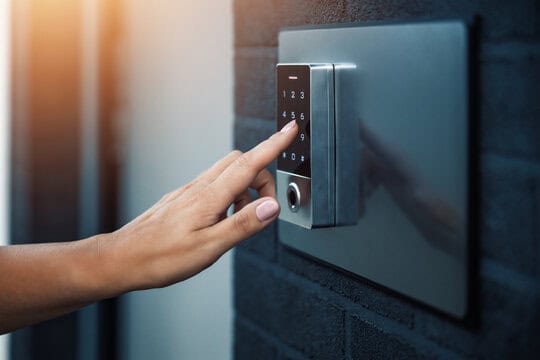
Traditional Locks
On the other hand, traditional locks are based on mechanical mechanisms and require a physical key to operate. They’re simple, reliable, and don’t depend on electronics, making them a good choice for those who prefer a no-fuss option. Traditional locks are typically more affordable and easier to maintain, but they lack the advanced security features found in smart locks, like tamper alerts or access control.
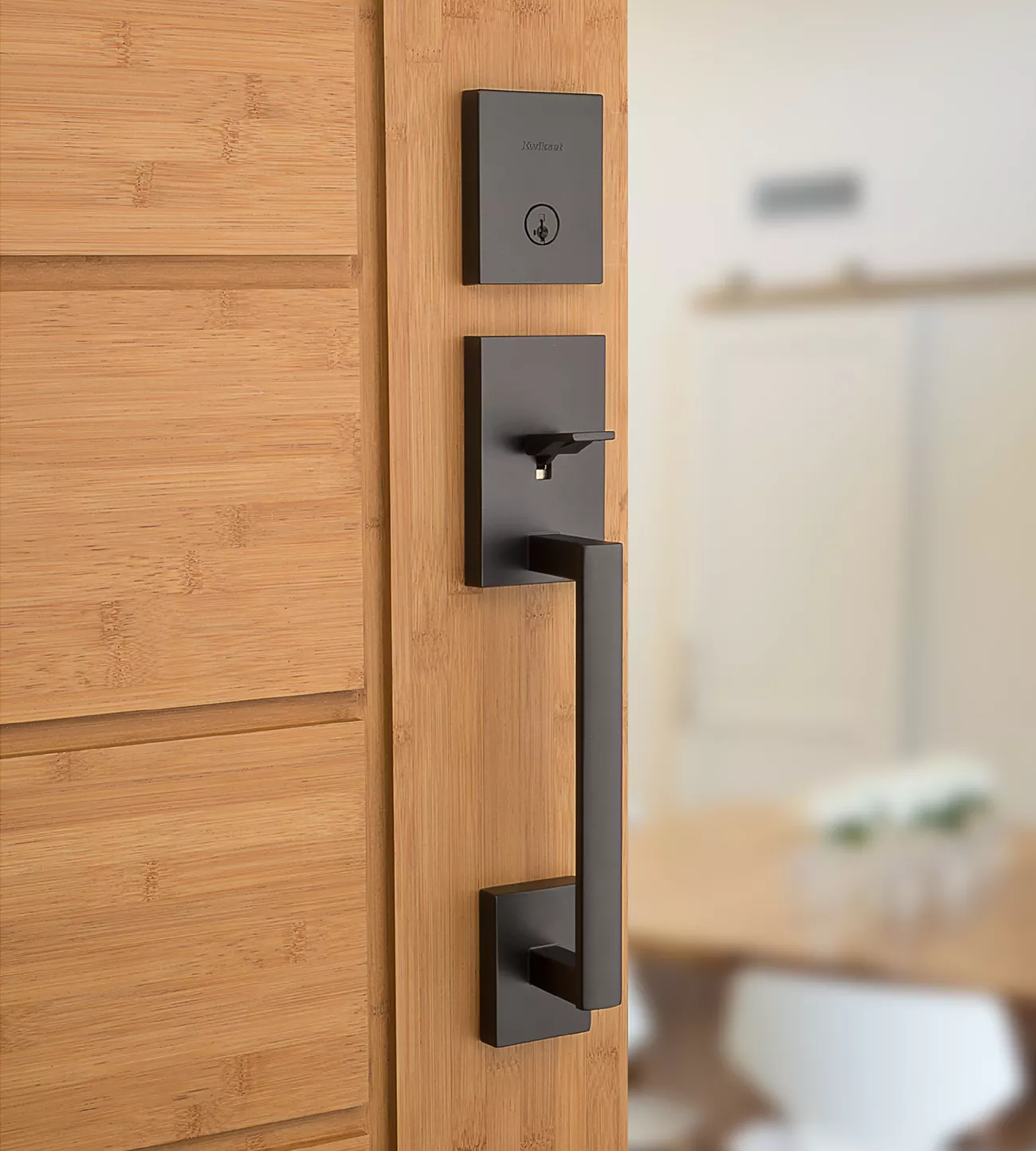
Understanding these key differences is essential for choosing a lock that matches your lifestyle and security needs.
Key Features of Smart Door Locks
- Biometric Authentication and Keyless Entry
Many smart lock provide biometric authentication options, like fingerprint or facial recognition, for added security. This eliminates the need for physical keys, which means no more worrying about lost or duplicated keys. - Remote Access and Control
With smart locks, you can use remote access to lock or unlock your door from anywhere using a smartphone app. This is convenient for granting temporary access to guests, service providers, or family members, all from your phone. - Smart Home Integration
Smart locks can integrate with other smart home devices like Amazon Alexa, Google Home, or Apple HomeKit. This enables seamless control over your home security system, allowing you to check and control your smart door lock hands-free or through voice commands. - Advanced Security Features and Encryption
Many smart locks come with advanced security features, including encryption and tamper alerts, to protect against hacking attempts and unauthorized access. Some even offer logs of who enters and exits, adding an extra layer of security.
They provide a level of convenience and control that traditional locks can’t match, especially if you’re looking for enhanced security and integration with a smart home system.
Traditional Locks: Pros and Cons
Advantages of Traditional Locks
- Low Cost
Traditional locks are generally more affordable than smart locks, making them a budget-friendly option for many homeowners. - Simplicity
With mechanical system or machine mechanisms and a physical key, traditional locks are straightforward to use. They don’t rely on apps, power sources, or Wi-Fi, which makes them reliable in any situation. - No Risk of Hacking
Since traditional locks aren’t connected to the internet, there’s no risk of hacking or digital intrusion. They’re not vulnerable to the cybersecurity threats that come with smart locks.
Disadvantages of Traditional Locks
- Limited Security Features
Traditional locks lack the advanced security features found in smart locks, such as tamper alerts or access control. This makes them more susceptible to lock picking and forced entry. - Risk of Key Loss or Theft
Physical keys can be lost, stolen, or duplicated, which can compromise home security. If you lose a key, you’ll likely need to replace the entire lock for safety.
While traditional locks offer simplicity and reliability, they lack the flexibility and features of smart door locks, which may be essential for some homeowners.
Smart Lock Security Concerns
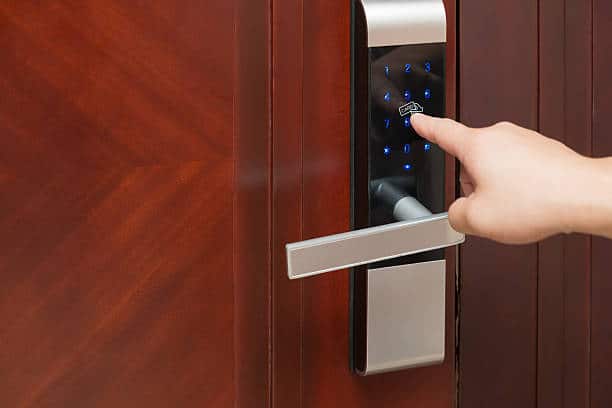
- Hacking Risks
Smart locks are connected to the internet, making them vulnerable to hacking. Unauthorized users may attempt to access your smart door lock through the internet or your smartphone app, potentially compromising home security. - Dependence on Technology
Smart locks rely on electronic components and require power to operate. This makes them dependent on batteries or a stable internet connection, which can pose a risk during power outages or if the batteries die. - Mitigating Security Risks
To enhance security, use strong passwords and enable two-factor authentication where possible. Regularly updating the software on your smart lock and checking for potential issues can also help minimize risks. Keeping your smart lock system maintained is essential for preventing technical failures and ensure to enhance security.
While smart locks bring modern convenience, they also require careful management to keep your home secure.
Traditional Lock Security Measures
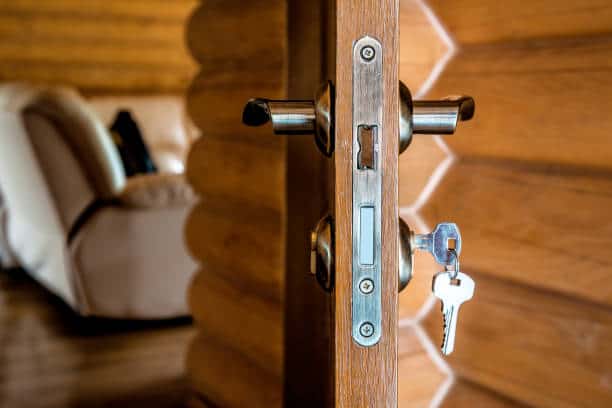
- Mechanical Locking Mechanisms
Traditional locks rely on sturdy mechanical systems or machine like deadbolts, latch locks, and chain locks to keep doors secure. These locks are highly durable and difficult to force open when installed correctly. - Physical Security Reinforcements
To enhance the effectiveness of traditional locks, you can reinforce your door frame, hinges, and strike plates. These physical measures add an extra layer of security, making it harder for intruders to break in by force. - Protection Against Picking and Bumping
Higher-quality traditional door locks are designed to resist lock pickings and bumping techniques. Opting for anti-pick and anti-bump features can reduce the likelihood of these types of intrusions.
Though traditional locks don’t have the high-tech options of smart locks, adding physical reinforcements can make them a solid, secure choice for many homes.
Installation and Maintenance
- DIY Installation Options
Both smart and traditional locks can be installed by homeowners. Traditional locks are usually straightforward to install with basic tools. Some smart door locks also come with easy setup instructions, but more advanced models may require more time and familiarity with technology. - Professional Installation Services
If you prefer a hassle-free setup, professional service installation is available for both smart locks and traditional locks. Smart locks with features like smart home integration or advanced security features may benefit from professional installation to ensure they work seamlessly with other smart devices. - Maintenance and Troubleshooting
Traditional locks require occasional lubrication and checks for wear and tear, while smart locks need regular battery replacements and software updates to keep everything running smoothly. Staying on top of these maintenance tasks helps extend the lifespan and reliability of your locks.
Choosing the Right Lock for Your Home
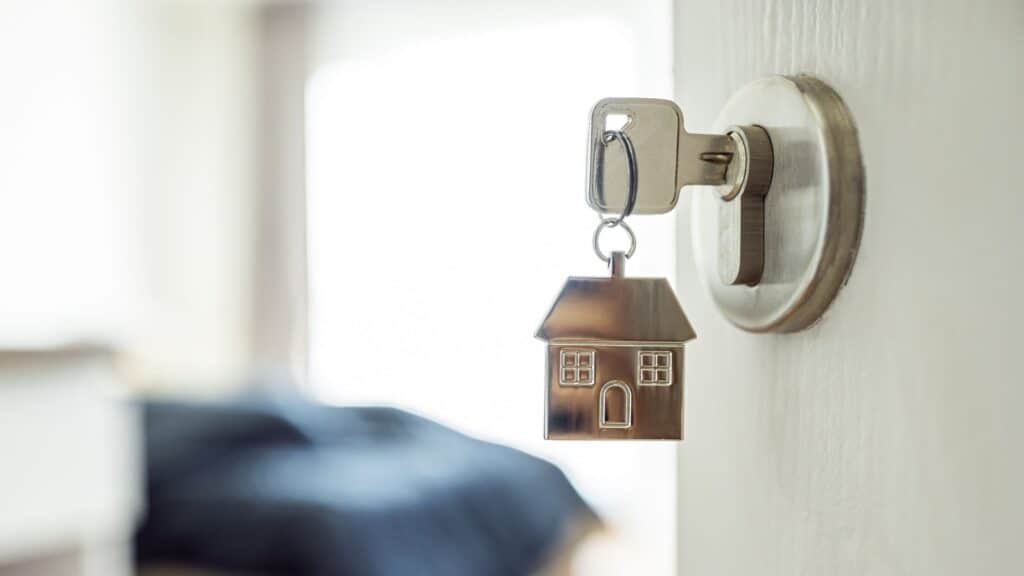
- Assessing Security Needs
Start by evaluating your home’s specific security requirements. If you need remote access or frequent access control for guests, smart locks might be a better fit. For straightforward security without extra features, traditional locks can still offer solid protection. - Budget and Cost-Effectiveness
Traditional locks are generally more affordable upfront and low-maintenance, making them a cost-effective choice for those on a budget. Smart locks are more expensive but provide extra features like keyless/smart entry and smart home integration, which can add convenience and flexibility. - Convenience and Lifestyle Compatibility
Think about your day-to-day lifestyle and preferences. As technology advances, smart locks are ideal for those who value convenience and tech integration, while traditional locks suit those who prefer simplicity and reliability without the need for constant battery changes or software updates. - Maintenance and Reliability
Smart locks require regular battery replacements and software updates, while traditional locks need minimal upkeep—maybe just an occasional lubrication. If you want a hands-off solution, traditional locks are more self-sustaining. - Compatibility with Smart Home Systems
If you already use smart home devices like security cameras or automated lighting, a smart lock that integrates smoothly with your system may enhance your security setup. Traditional locks don’t offer this connectivity, which might be a limitation for tech enthusiasts.
Smart Door Lock vs Traditional Lock: What’s the Difference?
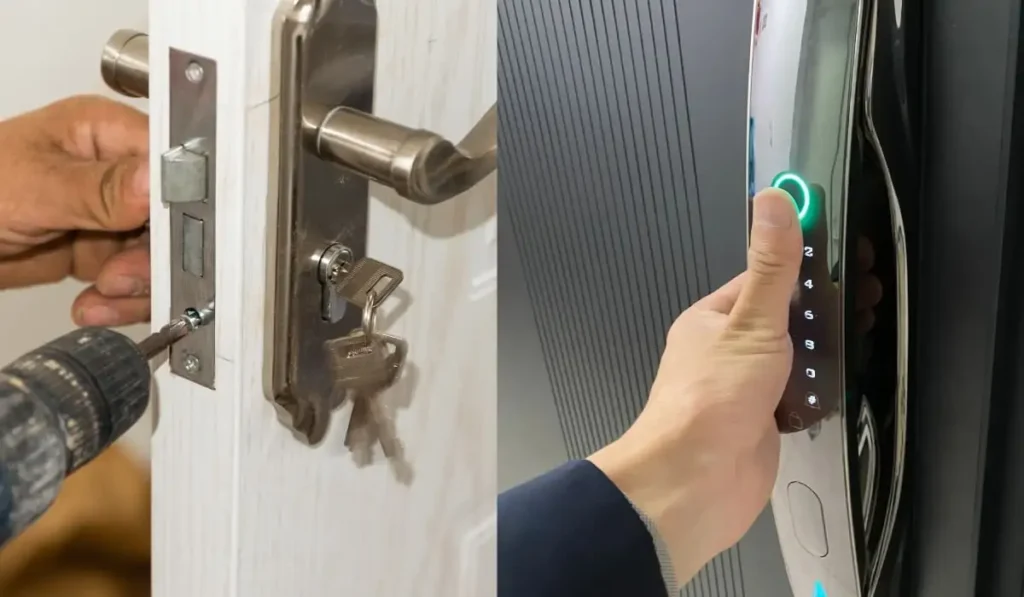
| Feature | Smart Door Locks | Traditional Locks |
| Technology-Driven | Uses electronic mechanisms for features like keyless entry, remote access, and smart home integration. | Uses mechanical mechanisms and physical keys. |
| Enhanced Control | Operated through a smartphone app, enabling locking/unlocking from anywhere with activity notifications. | Requires physical presence to operate with a key. |
| Advanced Security Features | Includes options like biometric authentication, tamper alerts, and access logs for extra security layers. | Primarily relies on deadbolt strength and physical barriers. |
| Potential Drawbacks | Dependent on power and internet, can be vulnerable to hacking, and requires regular maintenance (battery and software updates). | Immune to hacking, no need for power, updates, or batteries. |
| Simple and Reliable | High-tech features increase flexibility but require digital management. | Straightforward and dependable; little to no upkeep needed. |
| No Digital Vulnerabilities | Connected to the internet, so cybersecurity measures are essential to prevent hacking risks. | No internet connectivity; hacking risks are nonexistent. |
| Cost-Effective | Higher initial and maintenance costs due to advanced features. | Generally more affordable, suitable for tight budgets. |
| Limited Features | Offers remote access, smart key, and smart home integration for enhanced convenience. | Does not provide remote access or smart home integration |
Smart Lock Compatibility and Integration
- Smart Home System Integration
Many smart locks can seamlessly connect to popular smart home systems like Amazon Alexa, Google Home, and Apple HomeKit. This allows you to control your smart door lock with voice commands or through a central app, making it easy to monitor and manage your home security from one place. - Mobile App Control and Remote Access
A major benefit of smart locks is the ability to use a mobile app for remote access. With app control, you can lock or unlock your door, receive notifications, and monitor entry activity from anywhere, adding a new level of convenience and peace of mind. - Compatibility with Other Smart Devices
Smart locks often integrate with other smart home devices like security cameras or smart lights to create a fully connected home security system. This allows you to automate actions, like having your lights turn on when the smart lock opens, enhancing both security and convenience.
If you already have a smart home setup or plan to add more smart home devices, a smart lock that’s compatible with your existing system can make managing your home security effortless.
Traditional Lock Limitations
- No Remote Access or Smart Home Integration
Traditional locks don’t offer remote access or integration with smart home systems. This means you can’t control them from afar, check their status, or grant temporary access without physically being there. - Limited Security Features
Unlike smart locks, traditional locks lack advanced security features like tamper alerts, access logs, or activity notifications. This makes it harder to monitor who’s entering or exiting your home. - Physical Security Risks
Traditional locks are vulnerable to physical methods of tampering, such as lock picking or bumping. While high-quality deadbolt locks can help reduce these risks, they still don’t offer the same level of control and customization as smart locks.
For those looking for basic, reliable security, traditional locks are still effective but come with some limitations in terms of convenience and remote management.
Smart Lock Benefits
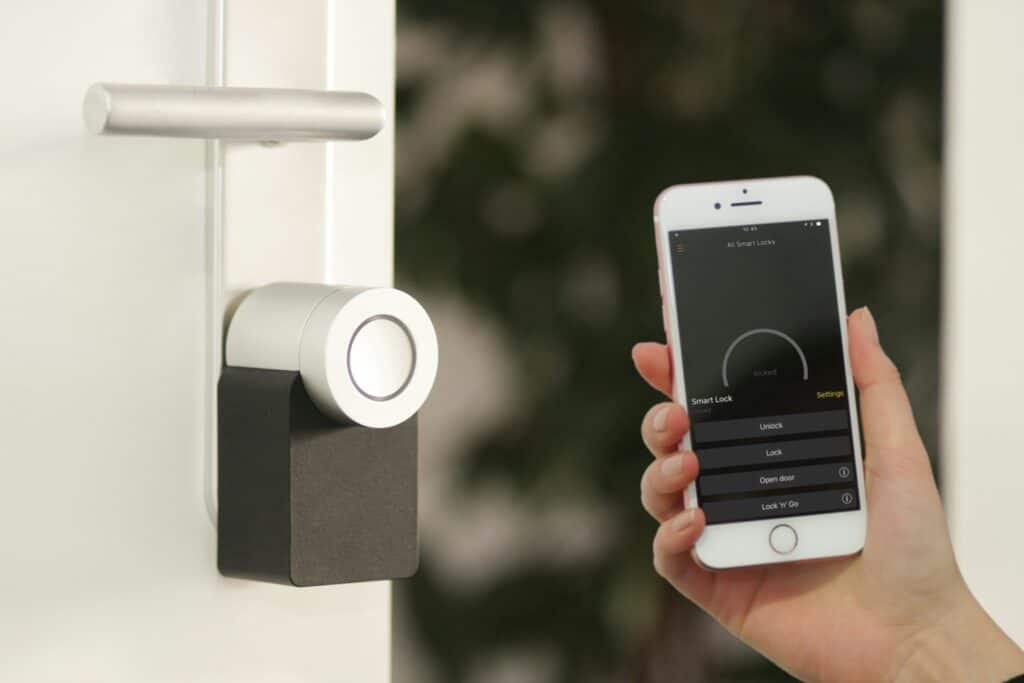
- Increased Security and Convenience
Smart locks provide smart key and remote access, allowing you to control and monitor your door from anywhere. Features like biometric authentication add extra security, reducing the chances of unauthorized access. - Smart Home Integration
Smart locks can integrate seamlessly with smart home systems and other connected devices, offering a unified approach to home security. You can link your smart lock with security cameras or lights, creating automated routines that enhance safety and convenience. - Advanced Features and Customization
Many smart locks come with advanced security features like tamper alerts, access logs, and temporary access options, making them highly customizable. You can set different access levels for family members, guests, or service providers, giving you full control over who enters your home.
For those seeking modern convenience, smart locks offer a variety of features that go beyond traditional locking mechanisms, making them a popular choice for homeowners looking to build a smart home setup.
Traditional Lock Benefits
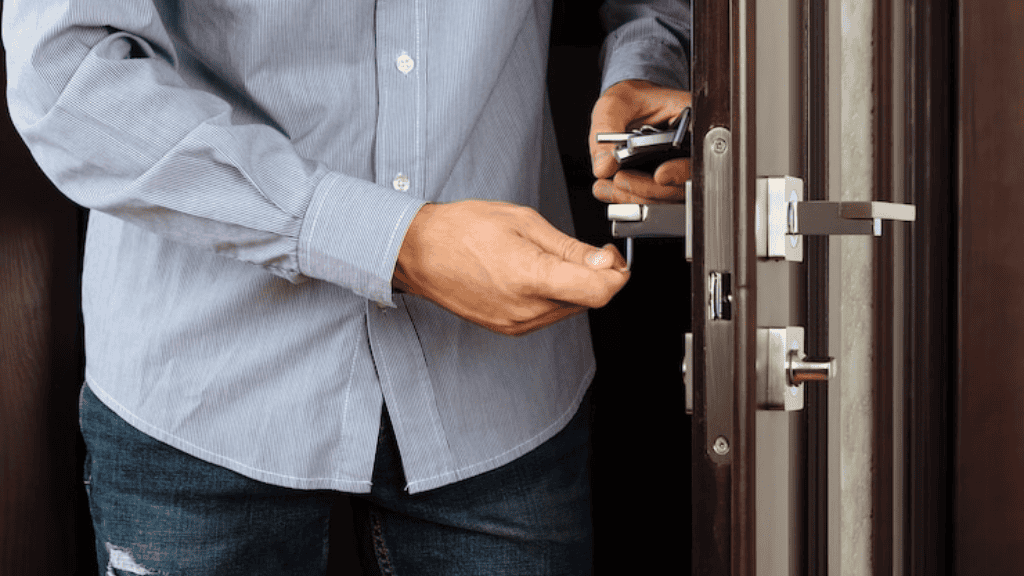
- Low Cost and Simplicity
Traditional locks are generally more affordable and straightforward, making them a budget-friendly choice. With no apps, batteries, or software, they’re easy to install and maintain, ideal for those who prefer a no-fuss approach to home security. - No Risk of Hacking
Since traditional locks aren’t connected to the internet or any network, they don’t carry the risk of hacking. They’re a solid choice if you’re concerned about cyber threats and want to avoid potential digital vulnerabilities. - Reliable in Any Situation
With mechanical mechanism and no reliance on power, traditional locks work consistently, even during power outages. This makes them a dependable choice for those who want to avoid issues with battery replacements or software updates.
Traditional locks offer basic security with the benefit of simplicity and reliability, making them a great option for anyone who values straightforward, dependable protection without extra tech features.
Conclusion
In the debate of smart locks vs. traditional locks, each option brings unique advantages and limitations. Here’s a quick recap to help you decide:
- Smart Locks: Perfect for tech-savvy homeowners who value convenience and advanced security features like remote access, keyless entry, and smart home integration. These smart locks offer convenience, customization and control but come with a higher price tag and require regular maintenance, such as battery replacements and software updates.
- Traditional Locks: A dependable choice for those who prefer simplicity, traditional locks are budget-friendly, require no internet or battery power, and carry no risk of hacking. They’re effective but lack the enhanced security options that smart locks provide.
Ultimately, choosing between a smart lock and a traditional lock depends on your needs, lifestyle, and budget. If you’re looking for modern convenience and remote management, a smart door lock with advanced features might be the right fit. On the other hand, if reliability and simplicity are more important to you, a traditional lock is a solid, affordable choice.
Some homeowners even use both, a smart lock for everyday use and a traditional deadbolt for backup security. Consider your specific security needs and preferences, and you’ll find the lock that offers the best peace of mind for your home.
FAQs
1. Are smart locks as secure as traditional locks?
Yes, smart locks can be as secure as traditional locks, especially with advanced security features like tamper alerts and encryption. However, they can be vulnerable to hacking if not properly secured. Regular software updates and strong passwords can help keep them safe.
2. Do smart locks work during a power outage?
Most smart locks are battery-operated, so they’ll continue to work during a power outage. Just make sure to replace the batteries regularly to avoid any surprises.
3. Can I install a smart lock myself?
Yes, many smart locks are designed for DIY installation. However, some advanced models that integrate with smart home systems may require professional setup to ensure everything works smoothly.
4. Are traditional locks vulnerable to picking?
Yes, traditional locks can be picked, especially if they’re lower-quality models. However, many high-quality deadbolt locks come with anti-pick and anti-bump features to enhance security.
5. Which option is more cost-effective?
Traditional locks are generally less expensive, both in initial cost and maintenance. Smart locks offer more features but tend to be pricier. For those looking for affordability, traditional locks are a budget-friendly choice.
6. What kind of door lock is most secure?
High-quality deadbolt locks are often considered the most secure type of traditional lock due to their strong mechanical design. For smart options, look for smart locks with encryption, tamper alerts, and biometric authentication for maximum security.
7. Are smart locks worth it and safer than key locks?
In terms of access control and convenience, smart locks can be safer by offering features like access logs and remote access. However, key locks (traditional locks) do not have cyber vulnerabilities, making them reliable against hacking. The choice depends on whether you prioritize physical security or technological convenience.
8. What are the disadvantages of a smart door lock?
The main disadvantages of a smart lock include its dependency on batteries and internet connection, potential hacking risks, and generally higher cost. They may also require regular maintenance like software updates and battery replacements, making them less low-maintenance than traditional locks.
